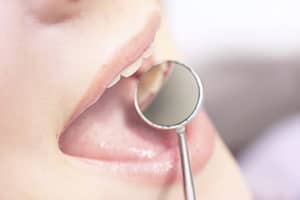What Is an Oral Cancer Screening?
An oral cancer screening is a quick, noninvasive procedure that allows us to detect potentially cancerous sores in your mouth. Oral cancer is one of the more dangerous cancers primarily because it tends to be detected late. When cancers are detected late, they are harder to treat, leading to lower odds of survival. But if oral cancer is detected sooner, it can be treated successfully.
This means that oral cancer screening is a potentially life-saving procedure that we encourage our patients to take advantage of.
What Are the Symptoms of Oral Cancer?
Not all oral cancers have symptoms that are easy to identify, and many of the symptoms of oral cancer can be mistaken for other illnesses. Some of the symptoms of oral cancer you might identify include:
- Sores that don’t heal
- White or reddish patches areas inside the mouth
- A lump or thickening of the skin in the mouth
- Loose teeth
- Changes in denture fit
- Difficulty chewing or swallowing
- Jaw pain or stiffness
- Pain on the tongue
- Throat soreness or irritation
It’s easy to see that many of these symptoms can be confused with a number of other conditions. Any time you experience loose teeth or significant changes in your denture fit, you should come into our office. Even if the problem isn’t oral cancer, it could be gum disease or other oral health problems.
For other oral symptoms, you can try home care for a couple weeks. Most causes of mouth sores (such as cold sores or canker sores) will resolve in two weeks, as will most causes of sore throat (such as a cold or flu). Jaw pain and stiffness will normally go away with a week or so of home care (eating soft food, over-the-counter medications, and hot/cold treatment). But if these symptoms persist, you need to see a doctor or dentist.
Who Is at Risk for Oral Cancer?
Cancer is when the body’s cells “rebel,” and begin acting selfishly, consuming the body’s resources and reproducing at the expense of other tissues. Cancers are always occurring, but normally our body detects and destroys cancerous cells before they grow into large colonies, which we call tumors.
So, the “cause” of oral cancer is mutations in the body’s cells that cause this rebellion, but people who are at an elevated risk for oral cancer include:
- Smokers and users of chewing tobacco
- People who drink alcohol excessively
- People with HPV (human papilloma virus) infection
- People over the age of 55
- Men
- People with outdoor jobs are at increased risk for lip cancer
- People with weakened immune systems
As people are becoming aware of the dangers of tobacco use, it is decreasing as a risk factor for oral cancer. But along with that decrease, we are seeing a rise in HPV-related cancers. That’s good news and bad. HPV-related cancers often respond better to treatment, but because they don’t have the same visible symptoms, they can be harder to detect.
Men are about twice as likely to develop oral cancer as women, which is likely to persist since men are more likely to develop HPV-related infections.
How Does an Oral Cancer Screening Work?
 Our first step during an oral cancer screening is to perform a visual exam on the patient. We will look around, and do a physical palpation exam. If we find anything suspicious during this process, we then proceed to a Vizilite test.
Our first step during an oral cancer screening is to perform a visual exam on the patient. We will look around, and do a physical palpation exam. If we find anything suspicious during this process, we then proceed to a Vizilite test.
Vizilite uses a special light that cells with irregular DNA makeup, such as cancer cells, will reflect.
In a Vizilite exam, we will rinse your mouth with a light acid, called acetic acid. This helps dry out the mouth and makes it easier for the light to penetrate tissue so we can detect suspicious cells that are under the surface.
Then we will crack a Vizilite stick. This is a chemical light stick, similar to the glow sticks kids use to be seen on Halloween, but in a special color that is reflected by DNA. We will then put the light source in your mouth and look for areas that are reflecting the light.
It’s that simple, and takes less than five minutes.
The patient can also request a Vizilite exam upfront if they have concerns or due to risk factors. We will perform this exam on anyone who believes they are in need.
Where Can I Get an Oral Cancer Screening?
Many dentists offer oral cancer screening. In Boulder, CO Dr. David Evans offers this procedure, and you can schedule a screening by contacting our office.
